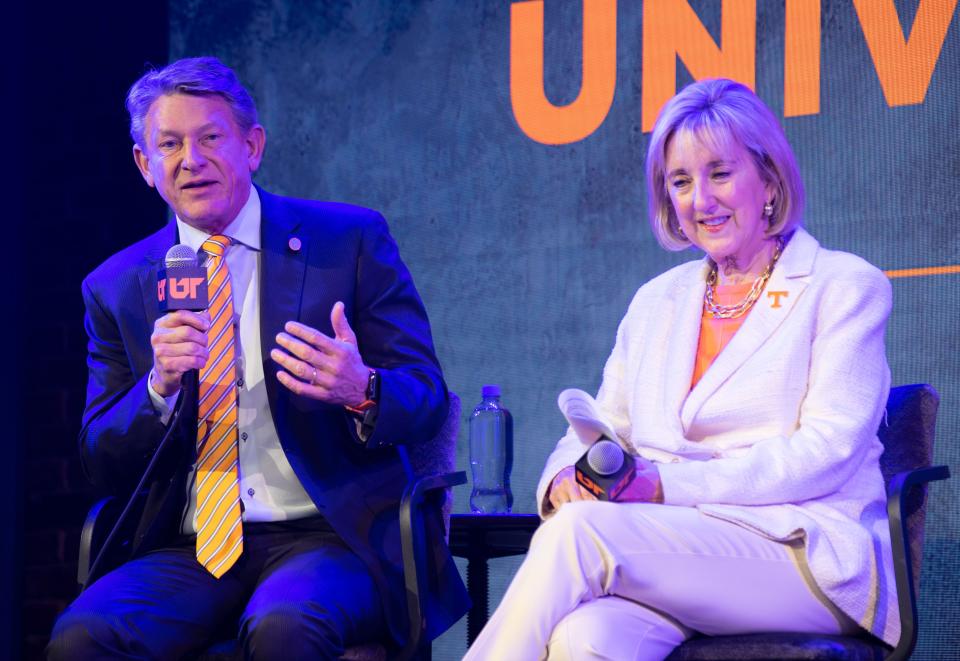How University of Tennessee plans to entice more graduates to work in the Volunteer State
University of Tennessee System leaders are finding ways to quickly adapt academic programs to build a workforce of graduates who meet Volunteer State companies' changing needs.
UT System President Randy Boyd and university chancellors have discussed creating more hands-on learning opportunities for students, working as a team to find a place for all students, and meeting the needs of Tennessee businesses that want qualified workers.
"That's one of the real beauties of the One UT spirit, is that somewhere in the UT System, we can meet the needs of everyone," UT Southern Interim Chancellor Linda C. Martin said.
The administrators explained their plan at a Feb. 8 panel discussion moderated by the USA TODAY Network.
Making changes quickly to meet workforce demands
Systemwide, leaders are focusing on being innovative, nimble and entrepreneurial so UT can "take a great leap forward," UT Chattanooga Chancellor Steve Angle said.
UT Knoxville Chancellor Donde Plowman said university leaders are good at listening to what business leaders need, but it can be hard to act as swiftly as they'd like. It shouldn’t take three years to implement a new degree, she said, and they’re working to speed up that process.
Tennessee industry leaders have said they'd have the capacity to employ at least double the output of engineering graduates each year, Plowman said.
UT Knoxville is expanding programs in the Tickle College of Engineering with a specialized applied engineering department. It also created the College of Emerging and Collaborative Studies specifically to meet changing industry needs.
UT Chattanooga is partnering with utility company EPB to educate middle school students about quantum technology to catch the beginning of the pipeline for a future workforce. It was also the first university to join EPB's quantum network, which gives the university more research, teaching and partnership opportunities in quantum technology and advanced STEM study.
UT Southern is focusing on credentialing and certifying students more quickly to meet the nursing demand across the state. Eighty percent of its nursing students go on to practice in rural areas, where nurses are needed most.

Industries are clamoring for graduates who can bring artificial intelligence experience to the workplace, and the system has responded by tapping leaders to address humanity's next great challenge. UT Chattanooga's vice chancellor for information and technology Vicki Farnsworth and UT Knoxville's associate vice chancellor Lynne Parker are leading AI initiatives on campus.
Preparing hands-on workers for Tennessee
One focus is creating a stronger a pipeline of graduates who want to work for Tennessee businesses. Right now, 40% of graduates leave the state for work, but about 49% of out-of-state students stay and work in Tennessee.
The UT System graduates about 13,000 students a year.
Plowman wants to reduce "brain drain" by providing hands-on internships and research opportunities to root students here even before they graduate.
UT Knoxville's Haslam College of Business struck a partnership this week with marketing agency Boldsquare to create a "residency" program that teaches marketing through asynchronous learning and projects in a real-life setting.
In West Tennessee, UT Martin is connected to five regional centers to give people other ways to earn degrees and transfer to UT Martin, its chancellor Yancy E. Freeman said.
Randy Boyd defends UT's 'rankings'
Boyd pushed back on the misconception that Tennessee College of Applied Technology is the only institution in the state providing workforce development training.
"I love TCATs. They're a great organization, indispensable for our economy," Boyd said. "But I hope you walk out of here today knowing that the University of Tennessee is also critical to the workforce needs of our state."
He also critiqued U.S. News & World Report's college ranking system for using selectivity, or how many students get rejected, as a measure of a school's worth.
"That's exactly the opposite of who we want to be. We want to be known for who we include, not who we exclude," Boyd said. "That's your University of Tennessee."
Boyd has championed the system's two largest inclusive admissions programs, guaranteed admissions policy for top in-state high schoolers and UT Promise.
Viewing University of Tennessee as one big campus
University of Tennessee's leaders don't compete with each other, they stressed, and they're focused on serving the state as a whole.
UT Institute of Agriculture has extensions in every county and works on food production research and teaching younger students as a 4-H organization.
UT Health Science Center is bringing dentists to the entire state, not just the Memphis area, thanks to the third year of a $55 million grant. UTHSC Nashville is launching a similar nursing program in Middle Tennessee soon.
“Memphis is our home, but Tennessee is our campus,” said UT Health Science Center Chancellor Peter F. Buckley.
Keenan Thomas is a higher education reporter. Email keenan.thomas@knoxnews.com. X, formerly known as Twitter @specialk2real.
Support strong local journalism by subscribing to knoxnews.com/subscribe.
This article originally appeared on Knoxville News Sentinel: University of Tennessee will adapt programs to meet business needs

